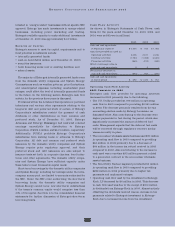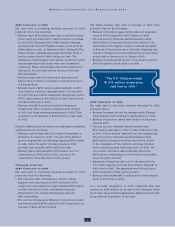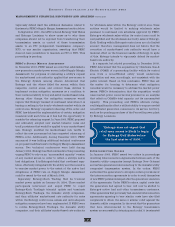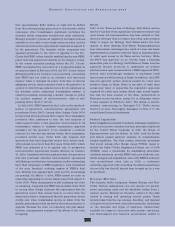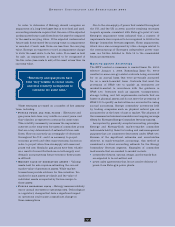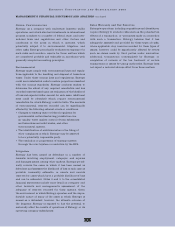Entergy 2003 Annual Report Download - page 43
Download and view the complete annual report
Please find page 43 of the 2003 Entergy annual report below. You can navigate through the pages in the report by either clicking on the pages listed below, or by using the keyword search tool below to find specific information within the annual report.
41
ENTERGY CORPORATION AND SUBSIDIARIES 2003
that approximately $280 million of costs will be shifted
from the interconnecting generators to the domestic utility
companies’ other transmission customers, including the
domestic utility companies’ bundled-rate retail customers.
Entergy intends to pursue all regulatory and legal avenues
available to it in order to have these orders reversed, and the
affected interconnection agreements reinstated as agreed to
by the generators. The domestic utility companies had
appealed previously to the Court of Appeals for the D.C.
Circuit the FERC orders initially establishing the new FERC
policy that was applied retroactively in the January orders.
In the orders currently pending before the D.C. Circuit,
FERC had applied the new policy on a prospective basis. In
an opinion issued in February 2003, the D.C. Circuit denied
Entergy’s petition for review in one proceeding, concluding
that FERC had not acted in an arbitrary and capricious
manner when it changed its policy from that of directly
assigning certain interconnection costs to the generator to
a policy in which those costs are borne by all customers on
the domestic utility companies’ transmission system. A
related proceeding concerning a similar change in policy
for another segment of interconnection costs is still
pending before the D.C. Circuit.
In July 2003, FERC issued its final rule on the standard-
ization of generation interconnection agreements and
procedures (Order 2003). Among other things, Order 2003
incorporates pricing policies that require the transmission
provider’s other customers to bear the vast majority of
costs required when a new generator interconnects to its
transmission system or requests transmission upgrades
necessary for the generator to be considered a network
resource for load serving entities within the transmission
provider’s control area. Order 2003 also requires that
generators that fund upgrades receive their money back,
with interest, in no more than five years. Order 2003, which
FERC has indicated is to be applied only to prospective
interconnection agreements, became effective on January
20, 2004. Consistent with their past practices, the generators
that had previously executed interconnection agreements
with Entergy and that have transmission credits outstanding
have filed complaints at FERC seeking to avail themselves
of the more beneficial crediting aspects of FERC’s final
rule. Entergy has opposed such relief and the proceedings
are pending. On March 5, 2004, FERC issued an order on
rehearing responding to certain issues raised with respect to
Order 2003. While management is still analyzing the order
on rehearing, it appears that FERC has modified Order 2003
to, among other things, eliminate the requirement that the
generators receive their money back in no more than five
years and include a requirement that the generators receive
credits only when transmission service is taken from the
specific generating facility served by the interconnection or
upgrade. Because the order on rehearing was just issued,
however, management’s analysis of the effects of the order
is ongoing.
Retail
Only in the Texas portion of Entergy Gulf States’ service
territory has there been significant movement toward retail
open access, but implementation has been delayed in that
territory. Entergy does not expect that retail open access is
likely to begin for Entergy Gulf States before the first
quarter of 2005. Entergy Gulf States’ Texas-jurisdictional
base rates remain unchanged as a result of a base rate freeze
implemented in connection with the delay in implementation
of retail open access in its Texas service territory. While
the PUCT has approved, on an interim basis, a business
separation plan for Entergy Gulf States in Texas, and has
approved market protocols to implement an interim
solution (retail open access without a FERC-approved RTO),
several other proceedings necessary to implement retail
open access are still pending in Texas. In addition, the LPSC
has not approved certain matters needed for retail open
access to begin in Texas. Delay in the start of retail open
access may delay or jeopardize the regulatory approvals
required for retail open access. Retail open access legisla-
tion has not been enacted in the other jurisdictions in
Entergy’s service territory, except for in Arkansas, where
it was repealed in February 2003. The status of electric
industry restructuring in Entergy’s U.S. Utility service
territory is more thoroughly discussed in Note 2 to the
consolidated financial statements.
Federal Legislation
Federal legislation intended to facilitate wholesale competition
in the electric power industry has been seriously considered
by the United States Congress, in both the House of
Representatives and the Senate. In 2003, both the House
and Senate passed separate versions of comprehensive
energy legislation. The bills contain electricity provisions
that would, among other things, repeal PUHCA, repeal or
modify the Public Utility Regulatory Policies Act of 1978
(PURPA), enact a mechanism for establishing enforceable
reliability standards, provide FERC with new authority over
utility mergers and acquisitions, and codify FERC’s authority
over market-based rates. Late in 2003, a conference
committee approved a bill reconciling the differences between
the two bills, but that bill has not been brought up for a vote
in the Senate.
NUCLEAR MATTERS
The domestic utility companies, System Energy, and Non-
Utility Nuclear subsidiaries own and operate ten nuclear
power generating units and the shutdown Indian Point 1
nuclear reactor. Entergy is, therefore, subject to the risks
related to owning and operating nuclear plants. These
include risks from the use, storage, handling, and disposal
of high-level and low-level radioactive materials, limitations
on the amounts and types of insurance commercially
available for losses in connection with nuclear operations,
and technological and financial uncertainties related to


